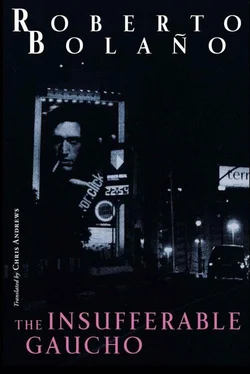Although it may not warrant an eminent place in the annals of literary mystery, the curious case of Álvaro Rousselot is worthy of attention, for a few minutes at least.
Keen readers of mid-twentieth-century Argentine literature, who do exist, albeit not in great numbers, will no doubt remember that Rousselot was a skilled narrator and an abundant inventor of original plots, a sound stylist in literary Spanish, but not averse to the use of Buenos Aires slang or lunfardo , when the story required it (as was often the case), though never in a mannered way, at least not for those of us who count ourselves among his faithful readers.
The action of that sinister and eminently sardonic character Time has, however, prompted a reconsideration of Rousselot’s apparent simplicity. Perhaps he was complicated. By which I mean much more complicated than we had imagined. But there is an alternative explanation: perhaps he was simply another victim of chance.
Such cases are not unusual among lovers of literature. In fact, they are not unusual among lovers of anything. In the end we all fall victim to the object of our adoration, perhaps because passion runs its course more swiftly than other human emotions, perhaps as a result of excessive familiarity with the object of desire.
In any case, Rousselot loved literature as much as any Argentine writer of his generation, or of the preceding and following generations, which is to say that his love was somewhat disillusioned. What I mean is that he was not especially different from the others, his peers — he knew the same torments and moments of joy — yet nothing even remotely similar happened to any of them.
At this point it could be objected, quite reasonably, that the others were destined for hells or singularities of their own. Angela Caputo, for example, killed herself in an unimaginable manner: no one who had read her poems, with their ambivalently childish atmosphere, could have predicted such an atrocious death, stage-managed down to the finest detail to maximize the terrifying effect. Or Sánchez Brady, whose texts were hermetic and whose life was cut short by the military regime in the seventies, when he had passed the age of fifty and lost interest in literature and the world in general.
Paradoxical deaths and destinies, yet they do not eclipse the case of Rousselot, the enigma that imperceptibly enveloped his life, the sense that his work, his writing, stood near or on the edge or the brink of something he knew almost nothing about.
His story can be recounted simply, perhaps because, in the final analysis, it is a simple story. In 1950, at the age of thirty, Rousselot published his first book, a novel about daily life in a remote Patagonian penitentiary, under the rather laconic title Solitude . Not surprisingly, the book relates numerous confessions about past lives and fleeting moments of happiness; it also relates numerous acts of violence. Halfway through, it becomes apparent that most of the characters are dead. With only thirty pages left to go, it is suddenly obvious that they are all dead, except for one, but the identity of that single living character is never revealed. The book was not much of a success in Buenos Aires, selling less than a thousand copies, but, thanks to some friends, Rousselot had the pleasure of seeing a well-respected publisher bring out a French edition in 1954. Solitude became Nights on the Pampas in the land of Victor Hugo, where it made little impact, except on two critics, one of whom reviewed it warmly, while the other was perhaps excessively enthusiastic; then it vanished into the limbo of remote shelves and overloaded tables in secondhand bookstores.
At the end of 1957, however, a film entitled Lost Voices was released; it was directed by a Frenchman named Guy Morini, and for anyone who had read Solitude , it was clearly a clever adaptation of Rousselot’s book. Morini’s film began and ended altogether differently, but its stem or middle section corresponded exactly to the novel. It would, I think, be impossible to recapture Rousselot’s feeling of stunned amazement in the dark, half-empty Buenos Aires cinema where he first saw the Frenchman’s film. Naturally, he considered himself a victim of plagiarism. As the days went by, other explanations occurred to him, but he kept coming back to the idea that his work had been plagiarized. Of the friends who were informed and went to see the film, half were in favor of suing the production company, while the others were inclined to think, more or less resignedly, that these things happen — think of Brahms. By that time, Rousselot had already published a second novel, The Archives of the Calle Peru , a detective story, with a plot that revolved around the appearance of three bodies in three different places in Buenos Aires: the first two victims had been killed by the third, the victim in turn of an unknown assailant.
This second novel was not what one might have expected from the author of Solitude , but the critics received it well, although it is perhaps the least successful of Rousselot’s works. When Morini’s film came out in Buenos Aires, The Archives of the Calle Peru had already been kicking around the city’s bookshops for almost a year, and Rousselot had married Maria Eugenia Carrasco, a young woman who moved in the capital’s literary circles, and he had recently taken a job with the law firm Zimmerman & Gurruchaga.
Rousselot’s life was orderly: he got up at six in the morning and wrote or tried to write until eight, at which time he interrupted his commerce with the muses, took a shower and rushed off to the office, where he arrived at around ten to nine. He spent most mornings in court or going through files. At two in the afternoon, he returned home, had lunch with his wife, and then went back to the office for the afternoon. At seven, he would have a drink with some of his legal colleagues, and by eight, at the latest, he was back home, where Mrs. Rousselot, as she now was, had his dinner ready, after which Rousselot would read, while María Eugenia listened to the radio. On Saturdays and Sundays he wrote for a little longer, and went out at night, unaccompanied by his wife, to see his literary friends.
The release of Lost Voices brought him a degree of notoriety beyond his circle of associates. His best friend at the law firm, who was not particularly interested in literature, advised him to sue Morini for breach of copyright. Having thought it over carefully, Rousselot decided not to do anything. After The Archives of the Calle Peru , he published a slim volume of stories, and then, almost immediately, his third novel, Life of a Newlywed , in which, as the title suggests, he recounted a man’s first months of married life, and how, as the days go by, the man comes to realize that he has made a terrible mistake: not only is the woman he thought he knew a stranger, she is also a kind of monster who threatens his mental balance and even his physical safety. And yet the guy loves her (or rather discovers that he is physically attracted to her in a way that he hadn’t been before), so he holds on for as long as he can before fleeing.
The book was, obviously, meant to be humorous, and was taken as such by the reading public, to the surprise of Rousselot and his publisher. It had to be reprinted after three months, and within a year more than fifteen thousand copies had been sold. From one day to the next, Rousselot’s name soared from comfortable semi-obscurity to provisional stardom. He took it in stride. With the windfall earnings, he treated himself, his wife, and his sister-in-law to a vacation in Punta del Este, which he spent surreptitiously reading In Search of Lost Time , a book he had always pretended to have read. While Maria Eugenia and her sister lolled about on the seashore, he strove to redeem that lie, but above all to fill the gap left by his ignorance of France’s most celebrated novelist.
Читать дальше












